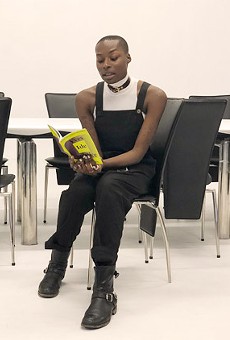While there are a limited (but important) amount of concrete things we can do to challenge racist and sexist national policies, our ability to creatively tackle inequity on local levels is just about boundless. Arts community organizer Rachel DeGuzman is continuing her series of creative forums, "At the Crossroads: Activating the Intersection of Art and Justice," on Saturday, December 9, with the audience-interactive performance "And, Ain't I a Woman: A Long Table Conversation and Installation."
As New York State celebrates 100 years of women's suffrage, the event takes into consideration that the movement excluded black women and that intersectionality in discussions of women's issues is still a major issue. "And, Ain't I a Woman" will make space for women of color to speak about contemporary issues and their own experiences.
Inspired by the "Long Table" performance-discussion hybrids by artist Lois Weaver, DeGuzman invited several WOC involved in the arts, education, and social justice — Amanda Chestnut, Reenah Golden, Tokeya Graham, Mara Ahmed, Jazzelle Bonilla, Erica Bryant, N'Jelle Gage-Thorne, Tianna Mañón, Debora McDell-Hernandez, Annette Ramos, and Gaynelle Wethers — to join her in a free-form, "dinner table" discussion about the intersection of race and gender. After the first 30 minutes of talk, audience members can tap someone on the shoulder and take their place to join the continued conversation.
"Generally, even discussions of diversity are usually through a white lens," DeGuzman says. "I thought it was important for them to start and hold the conversation, the first part of it, and then anyone can come join the conversation. It's disruptive, because that's not what we usually experience."
Named for abolitionist and Civil and Women's Rights advocate Sojourner Truth's speech — which was leveled at black men who weren't for women's suffrage and white women who didn't see black women as worthy of the vote — the performance also takes inspiration from DeGuzman's observations about the current lack of inclusiveness in discussions of women's issues. For example, she says, at many of the post-election women's marches, women wearing Black Lives Matter T-shirts were booed and instructed that "this wasn't their march."
We rarely speak of abolitionist Frederick Douglass outside of the context of his friendship with Susan B. Anthony, DeGuzman says. And while Rochester claims them both as historic heroes, we tend to gloss over Anthony's advocacy that women should get the vote before black people, and the fact that Douglass moved to Washington, D.C., after an arsonist burned his Rochester house to the ground. And though the North likes to put some space between itself and the South ideologically, Sojourner Truth was born a slave in New York State.
"So these are provocations for me thinking these are important conversations for us to have," DeGuzman says. "In the midst of us having a really important interrogation of sex, we can't forget the history of intersectionality" issues in Rochester.
DeGuzman says that while the event won't be moderated, there is some planned structure. Attendees will arrive and mingle over cheese and desserts and wine, coffee, or tea, check out Amanda Chestnut's installations, and have the opportunity to sharpie answers onto a wall of provocative questions. She's also asking those who register to bring articles or items about race and gender that they'd like to share, which she plans to send to the attendees afterward as an opportunity to carry the discussion into the future. And attendees are invited to bring photos of women of color — whether family or someone they're inspired by — to place on a Chestnut's altar installation for the duration of the show.
Before the discussion, Golden and Graham will share a spoken word performance that uses Truth's speech as a connective thread, followed by a screening of "Visual Activist," a short film by Zanele Muholi and produced by HumanRightsWatch, which explores the dangers faced by black South African lesbians.
There are only two rules to the Long Table conversation: no filibustering, and when people tap someone, they have to let them finish what they're saying before taking their seat.
"We're exploring things that we don't have answers for without a predetermined outcome of what's going to happen," DeGuzman says.
Gallery 74 is a community space, set within a neighborhood on the edge of Cornhill. DeGuzman says she's grateful that director Ralph Thompson was open to hosting this event. "Not everybody wants racism talked about in their spaces," she says, "and not everybody wants, in the home of Susan B. Anthony, to challenge that whole idea of the Suffrage Movement being all positive." She adds that it's ahistoric to think that it was.
The location also takes issues of class into consideration — "Why does all art have to happen in certain neighborhoods?" she says. "That's really important to me, to go to the neighborhood instead of saying, 'You come from the community, you have to come to our neighborhoods to see things that are supposed to be inclusive of you."
DeGuzman underscores that the event is an experimental, open-ended performance piece using equity and partnership as values, with an emphasis on trust. "You can't just ask for equity, you have to model it," she says.
Depending on how this one goes, DeGuzman says she envisions organizing another long table discussion in 2018.


